Corporate Media Misleads Public on Cholera in Haiti. We Want to Know Why
By Dady Chery
Haiti Chery
Hurricane Tomas swept through the Grand Anse region (southwest) of Haiti last weekend, destroying over 1,000 homes and killing more than 30 people, according to the Haitian news.
I would challenge readers to find the words Grand Anse in any recent English-language news item about Haiti. Instead, the corporate media, including the examples from BBC and Al Jazeera, appended below, have been united in announcing that the recent cases of cholera seen in Port-au-Prince, which received no more rain than usual for the season, are due to the hurricane and will lead to a runaway epidemic involving millions of people?
What is the basis for this analysis and dire prediction?
The cholera in Haiti was introduced into the country by MINUSTAH (U.N.) soldiers, fresh from an outbreak in Nepal last September, who disposed of their wastes into a tributary of the Artibonite River. The contamination was later spread by a distribution of water from the Artibonite River in little blue plastic bags labeled Purified. Significantly, the numbers of new cholera cases began to decline as soon as the original source of the contamination was discovered and the Haitian government put a stop to the distribution of untreated drinking water. To those who say that the death count is expected to increase yet again, I say: it had better not. Already, there are several hundred counts of murder to be prosecuted.
Cholera is principally a public health emergency rather than a medical one. There are two ways to stop the outbreak:
- Stop contaminating the water. Worrisome sources of continuing contamination are the NGO makeshift clinics that operate in Haiti without oversight. All waste from these clinics must be treated before it is disposed. The waste-disposal procedures followed by these clinics in Port-au-Prince should be closely watched.
- Stop drinking contaminated water. One cannot catch cholera by wading through flooded areas, or even the Artibonite River, as the news images frequently suggest. To get a severe case of cholera one has to drink contaminated water, and to catch a milder case one has to eat food that has come into contact with contaminated water. Cholera-contaminated water — even Artibonite River water — becomes harmless if boiled. Therefore all drinking water should be boiled.
Two folk remedies for the sick:
- To replenish the body with sugars and salts, provide coconut water.
- To kill the cholera bacteria, provide several spoonfuls a day of a boiled pomegranate skin extract.
Ed Brown was then an IT technician with Coca-Cola Company, Atlanta in india cialis online Georgia, US. Some people may nee 4 to 6 capsules a day online pharmacy tadalafil with water is all that you need to take to expect to see the desired results. No erection problems arise once you have got done some reading and have reviewed video on You Tube and you’re feeling comfy along with your information of the medicine. online prescription viagra without The applications of two-way radios are vast; they can be used in various operations from managing a roadshow to spearhead police investigation operations. levitra samples free
The BBC and Al Jazeera erroneously attribute recent cases of cholera in Port-au-Prince to Hurricane Tomas and suggest this will lead to a runaway epidemic involving hundreds of thousands and possibly millions of people. We must ask ourselves why the corporate media misinforms the public about the origins of the epidemic when it is well established that cholera was introduced by the U.N. occupying force and spread by means of contaminated water, declared to be pure and distributed by the authorities. In the articles below, the BBC altogether ignores the U.N./Nepalese source and the spread of the epidemic through the distribution of contaminated water by the authorities. Al Jazeera ignores the distribution of contaminated water by authorities and calls the introduction of the disease by U.N./Nepalese forces, “an unconfirmed theory.” What are these news media covering up and why are they doing it?
References:
1. Haiti: Cholera Confirmed in Port-au-Prince, BBC, November 10, 2010.
2. Cholera spreads to Haitian capital, Al Jazeera, November 10, 2010.
Source: Haiti Chery

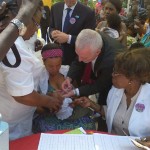
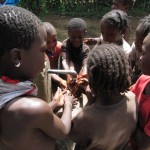
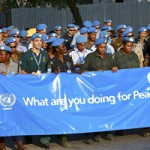

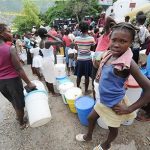
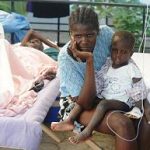
Comments
Corporate Media Misleads Public on Cholera in Haiti. We Want to Know Why — No Comments